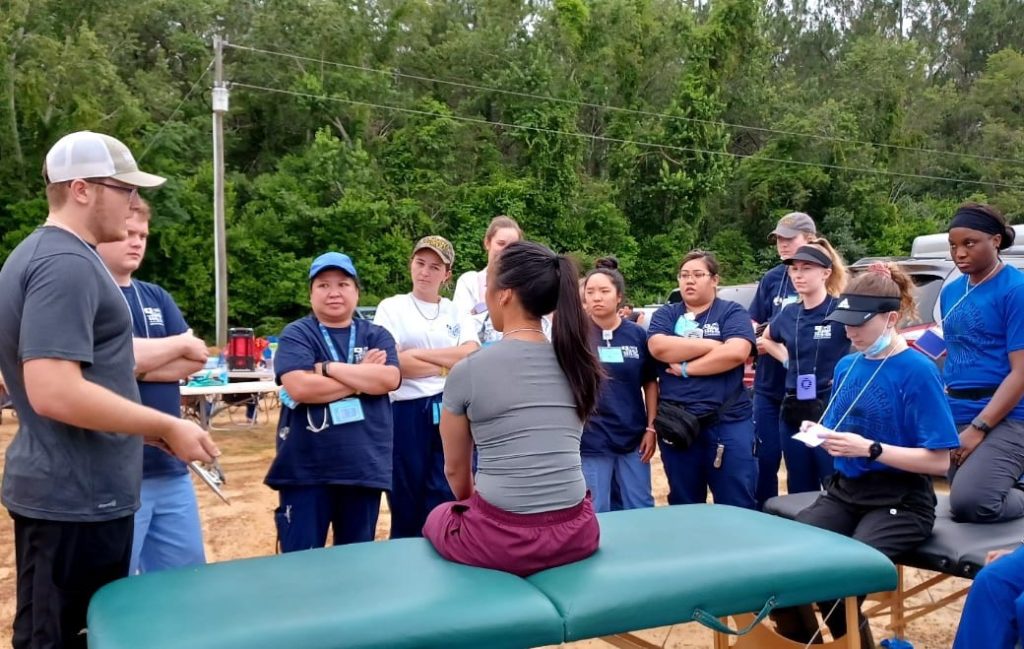Jul 1, 2021South Georgia migrant farm workers get physical therapy from students
On a hot South Georgia summer night, farmworkers line up across the grass at an outdoor clinic waiting area. The workers are waiting for a few minutes of individual care from third-year Doctor of Physical Therapy students, possibly the only healthcare these workers will get all year.
The clinic is part of the interdisciplinary, multi-university Farm Worker Family Health Program, organized by Emory University School of Nursing and supported locally by the Ellenton Clinic.
For nearly two decades, Georgia State physical therapy (PT) students have come to Moultrie, Georgia, to treat farmworkers and their families. These workers make a living doing hard manual work in the hot sun with little to no health benefits.
The PT students also assess the development of migrant workers’ children. More than 60 children rotate through stations at a local elementary school where PT students ask them to jump on one foot or do a few pushups or other exercises, all to determine the child’s gross and fine motor skills.
“The kids had a lot of fun [doing the evaluations], and most of them scored at least average or above in motor skills,” said Tiffany Greenwood, a third-year DPT student.
She enjoyed evaluating the children most of all in her PT experience in Moultrie.
“I want to work in pediatric PT,” Greenwood said. She is a former children’s dance teacher who has returned to school for a new career.
After eating a boxed lunch supplied by a local church and taking a quick nap or study time, the PT students moved to sites near the fields where the adult farmworkers labor. For four nights, between 6 and 11 p.m., the students treated about 110 adults. Workers stopped by for treatment after eating dinner and taking a shower, seeking relief from the pains of their repetitive motion work.
“We evaluated them for orthopedic issues such as back, shoulder and knee pain,” Greenwood said.
Under the faculty’s supervision, the PT students diagnosed soft-tissue injuries and joint pain and treated the injuries with manual therapy, exercise and a back or knee brace when needed. The students also showed the workers exercises that might bring them relief.
“These workers start their day at 5 a.m. and work until 6 or 7 p.m. most days,” Greenwood said. “It was humbling to help them with their orthopedic issues.”
“(The farmworkers) work so hard for us, so it was nice to do something for them,” said DPT student Alex Maeder.
Maeder said she learned a lot from the faculty and appreciated the opportunity to improve efficiency in caring for the workers.
PT faculty and trip coordinator Jodan Garcia said the planning for the 2021 service-learning opportunity was different from previous years. The program took 50 percent fewer student health providers except for physical therapy students, who were explicitly requested.
“COVID protocols made treatment more challenging,” Garcia said, “especially communications since we were all wearing masks.”
Doctor of Physical Therapy (DPT) program director and trip co-coordinator Kimberly Morelli said COVID-19 forced the faculty and student team to become more organized.
“The interdisciplinary faculty team wrote a 15-step standard operating procedure manual before the trip, something we needed to do but hadn’t made time to get it on paper,” she said.
Flexibility ruled the trip, and the students adapted better to the numerous challenges and changes than any previous group of PT students. The students participating in the Moultrie-based project chose to make the trip, and several wanted to volunteer again in the future as professionals after graduation.
“The whole clinic was very efficient, possibly because students were used to adapting because of the hybrid learning model implemented during COVID restrictions,” Morelli said.
“The Farm Worker Family Health Program matches who we, Georgia State University, are as a community,” Garcia said. “Caring for those who are forgotten and underserved.”
– Angela Go, Georgia State University















